
npj Aging
Scope & Guideline
Fostering interdisciplinary dialogue on aging.
Introduction
Aims and Scopes
- Cellular and Molecular Mechanisms of Aging:
Research focusing on the cellular and molecular pathways that contribute to aging, including studies on senescence, oxidative stress, and mitochondrial dysfunction. - Cognitive Aging and Neurodegeneration:
Investigations into the cognitive aspects of aging, including the mechanisms behind cognitive decline, neurodegenerative diseases like Alzheimer's, and potential biomarkers for early diagnosis. - Interventions and Therapies:
Exploration of various interventions, including pharmacological treatments, lifestyle modifications, and regenerative medicine approaches aimed at mitigating age-related decline and enhancing healthspan. - Environmental and Lifestyle Factors:
Studies examining the impact of diet, exercise, and environmental factors on the aging process and their role in promoting healthy aging. - Health Economics and Policy:
Research addressing the implications of aging populations on healthcare systems, including cost analyses and strategies for managing age-related diseases.
Trending and Emerging
- Senescence and Senotherapeutics:
There is a growing emphasis on understanding cellular senescence and the development of senotherapeutics, reflecting an increasing interest in targeting senescent cells to improve health outcomes. - Multi-Omics Approaches:
The integration of multi-omics data (genomics, proteomics, metabolomics) in aging research is on the rise, facilitating a more comprehensive understanding of the biological processes underlying aging. - Digital Health and Technology in Aging Research:
Research utilizing digital tools and technologies, such as machine learning and wearable devices, to monitor and assess cognitive decline and other age-related changes is becoming increasingly prominent. - Environmental and Lifestyle Interventions:
An emerging focus on how lifestyle factors and environmental influences, such as diet and exercise, interact with biological aging processes to promote healthy aging. - Chronic Disease Interplay with Aging:
Increasing attention is being paid to how chronic diseases, such as diabetes and cardiovascular conditions, intersect with aging processes, influencing overall health and longevity.
Declining or Waning
- Genetic Studies in Aging:
Research focusing on genetic factors influencing aging has become less prevalent, possibly due to a shift towards more integrative approaches that combine genetic, environmental, and lifestyle factors. - Traditional Models of Aging:
Studies utilizing traditional aging models, such as specific inbred mouse strains, have seen a decline in favor of more innovative models, including heterochronic parabiosis and multi-species approaches. - Single-Factor Analysis of Aging:
There is a noticeable reduction in studies that analyze aging through a single-factor lens, such as focusing solely on one type of cellular or molecular mechanism, as researchers increasingly adopt multidisciplinary perspectives.
Similar Journals
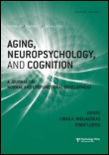
AGING NEUROPSYCHOLOGY AND COGNITION
Championing research for a brighter cognitive future.AGING NEUROPSYCHOLOGY AND COGNITION, published by ROUTLEDGE JOURNALS, TAYLOR & FRANCIS LTD, is a leading scholarly journal that spans the interdisciplinary fields of psychology, neuropsychology, and gerontology. With a strong focus on understanding aging processes and cognitive function, this journal serves as a critical platform for researchers, clinicians, and students dedicated to advancing knowledge in the realm of cognitive aging. The journal, established in 1994, presents high-quality research articles, comprehensive reviews, and innovative studies that contribute to the discourse surrounding mental health and aging. Notably, it has been recognized with a 2023 Q2 ranking in Experimental and Cognitive Psychology and Neuropsychology categories, reflecting its significant impact within these domains. The journal includes open access options, making it widely accessible to a global audience. Researchers interested in the latest findings and theoretical developments in aging neuropsychology will find this journal an invaluable resource, further enhanced by its robust Scopus rankings and commitment to academic excellence through 2024 and beyond.

Frontiers in Aging
Fostering Multidisciplinary Dialogues on AgingFrontiers in Aging is a leading academic journal published by FRONTIERS MEDIA SA, dedicated to advancing the understanding of the biological processes associated with aging. Established in 2020, this open-access journal aims to bridge the gap between various disciplines including genetics, molecular biology, and physiology, providing a multidisciplinary platform for researchers and clinicians alike. With a notable impact factor denoted by its Q2 quartile rankings in Aging, Genetics, and Molecular Biology, and a Q1 ranking in Physiology as of 2023, the journal is recognized for its contribution to the scientific community. Located in Lausanne, Switzerland, it is committed to promoting open discourse and publishing cutting-edge studies that address the complexities of aging and its implications for health and longevity. The journal’s editorial board, consisting of leading experts, ensures the rigorous peer-review process, maintaining high academic standards and fostering innovation in aging research.
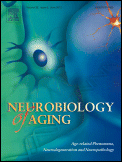
NEUROBIOLOGY OF AGING
Decoding Neurobiological Mechanisms of AgingNEUROBIOLOGY OF AGING, published by Elsevier Science Inc, is a premier journal dedicated to advancing our understanding of the complex interactions between the aging process and neurobiological mechanisms. With an ISSN of 0197-4580 and E-ISSN 1558-1497, the journal has established itself as a critical resource in the fields of Aging, Developmental Biology, Geriatrics and Gerontology, Clinical Neurology, and Neuroscience. Boasting a Q1 ranking in multiple categories, the journal is positioned within the top echelons of scholarly publication, underscoring its significant impact with an impressive Scopus ranking in various subfields. Committed to disseminating high-quality, peer-reviewed research, NEUROBIOLOGY OF AGING welcomes original articles, reviews, and research notes aiming to uncover the underlying processes of aging on the nervous system, fostering collaboration among researchers, professionals, and students alike. Although primarily subscription-based, the journal continues to play a vital role in shaping the discourse on aging and neurobiology, making it an essential publication for those engaged in this dynamic field.

Aging-US
Fostering Innovation in Aging ScienceAging-US is a premier peer-reviewed journal dedicated to advancing the field of aging research and cell biology. Published by IMPACT JOURNALS LLC, this journal serves as a vital resource for researchers and professionals exploring the biological mechanisms of aging and their implications for health and disease. With a commendable impact factor reflected in its 2023 Scopus rankings, where it stands at Rank #10/38 in the category of Aging and Rank #63/285 in Cell Biology, Aging-US exemplifies rigorous scientific excellence. Its open access policy enhances accessibility, fostering a wider dissemination of knowledge in both academic and clinical settings. Spanning from 2009 to 2024, the journal provides a platform for groundbreaking studies and innovative methodologies, ensuring that it remains at the forefront of the dynamic conversations surrounding aging and cellular biology. Engage with Aging-US to contribute to the evolving narratives of longevity and cellular health.

GeroScience
Exploring Innovations in Age ResearchGeroScience, published by Springer, is an esteemed open-access journal that focuses on the multidisciplinary field of aging research. Since its inception in 2017, the journal has quickly established itself as a leader in its field, achieving impressive Q1 quartile rankings across various categories, including Aging, Cardiology and Cardiovascular Medicine, Geriatrics and Gerontology, and Complementary and Alternative Medicine, as per 2023 evaluations. With a significant impact factor that underscores its influence and reach in academia, GeroScience aims to disseminate high-quality research that addresses the complex challenges and advancements related to aging. Its accessible publication format fosters greater dissemination of knowledge and encourages collaboration among researchers, practitioners, and students eager to contribute to the growing body of work on age-related health issues. As it continues to thrive, GeroScience remains a pivotal resource for anyone looking to stay at the forefront of aging research.

npj Aging and Mechanisms of Disease
Championing Open Access to Aging Researchnpj Aging and Mechanisms of Disease is a leading open-access journal dedicated to advancing the understanding of the biological mechanisms underlying aging and age-related diseases. Published by NATURE PORTFOLIO in the United Kingdom, this journal has established itself as a vital resource within the fields of Aging and Geriatrics and Gerontology, proudly holding a prestigious Q1 ranking in both categories as of 2023. With an impressive Scopus ranking, placing it in the top 10 for Geriatrics and Gerontology, and the top 9 for Aging, the journal is committed to disseminating high-quality, peer-reviewed research that offers innovative insights and fosters collaboration among researchers and practitioners. Since its inception in 2015, npj Aging and Mechanisms of Disease has embraced the open-access model, ensuring that groundbreaking findings are freely available to all, thereby promoting widespread knowledge-sharing within the scientific community. This journal serves as an essential platform for those seeking to explore the complex interplay of genetic, molecular, and environmental factors that influence aging and its associated challenges.
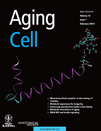
AGING CELL
Pioneering Insights into Aging and Cell BiologyAGING CELL is a premier peer-reviewed journal published by Wiley, specializing in the rapidly evolving field of aging research and cell biology. Established in 2002 and enjoying an impressive track record as evidenced by its Q1 ranking in both Aging and Cell Biology categories for 2023, the journal has become a vital resource for researchers and professionals alike. With a significant impact factor highlighting its scholarly influence, AGING CELL offers an open access model since 2014, ensuring that groundbreaking research is accessible to the global community. The journal covers a wide array of topics related to the mechanisms of aging at the cellular and molecular levels, making it essential reading for anyone invested in understanding the complexities of aging processes and their implications for health and disease. With a broad international readership based in the United Kingdom and beyond, AGING CELL is dedicated to disseminating high-quality research that impacts scientific understanding and fosters advances in the field.

EXPERIMENTAL AGING RESEARCH
Innovating Knowledge for a Longer LifeEXPERIMENTAL AGING RESEARCH, published by Taylor & Francis Inc., is a leading journal that has been at the forefront of aging research since its inception in 1975. With an ISSN of 0361-073X and an E-ISSN of 1096-4657, this journal has earned a notable reputation, including a Q3 ranking in the field of Aging and impressive Q1 and Q2 rankings in Arts and Humanities and Geriatrics and Gerontology respectively. This positions the journal within the top percentile of its category, highlighting its significant impact and contribution to the scientific community. Covering a broad scope that intersects various disciplines, EXPERIMENTAL AGING RESEARCH aims to disseminate pioneering research, foster interdisciplinary collaboration, and provide a platform for innovative studies that enhance understanding of the aging process. While it currently does not offer Open Access, researchers and academics can access its rich repository of knowledge that spans multiple facets of aging, from physiological changes to psychological impacts. As the field of aging continues to evolve, this journal remains an essential resource for researchers, professionals, and students dedicated to advancing knowledge and practices concerning aging and longevity.
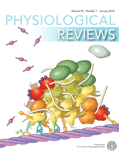
Physiological Reviews
Illuminating the Complexities of Life Through PhysiologyPhysiological Reviews is a prestigious journal published by the American Physiological Society, dedicated to advancing our understanding of physiology across various domains. With an impressive impact factor that places it in Q1 quartiles for medicine, molecular biology, and physiology as of 2023, this journal is recognized as a leading source of high-quality reviews and research analyses. The journal has been a vital resource for the scientific community since its inception in 1945, providing in-depth and comprehensive insights that are crucial for both scholars and practitioners in the field. Although not an open-access publication, it remains widely accessible through institutional subscriptions, ensuring that crucial research findings are disseminated efficiently. With Scopus rankings that place it in the top percentile across multiple categories, Physiological Reviews continues to be an essential platform for the latest advancements and discoveries in physiology, making it indispensable for researchers, professionals, and students alike.
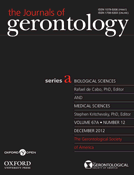
JOURNALS OF GERONTOLOGY SERIES A-BIOLOGICAL SCIENCES AND MEDICAL SCIENCES
Advancing the Science of Aging for Healthier FuturesJournals of Gerontology Series A: Biological Sciences and Medical Sciences, published by Oxford University Press Inc, stands at the forefront of aging research, bridging the gap between biological sciences and medical practices to address the complexities of gerontology. With an impressive impact factor reflecting its significant contribution to the field, this journal is recognized within the Q2 quartile in Aging and the Q1 quartile in Geriatrics and Gerontology for 2023, evidencing its high-quality scholarship and relevance. Researchers and professionals will find valuable insights through its comprehensive coverage of aging-related topics, informed by cutting-edge studies ranked among the top in their category—Rank #11 in Geriatrics and Gerontology and Rank #9 in Aging on Scopus. The journal aims to disseminate innovative research that can impact health care practices and enhance the quality of life in older populations. For those engaged in studies of aging, this journal offers a vital platform for sharing knowledge and advancing the understanding of biological and medical sciences as they pertain to gerontology.